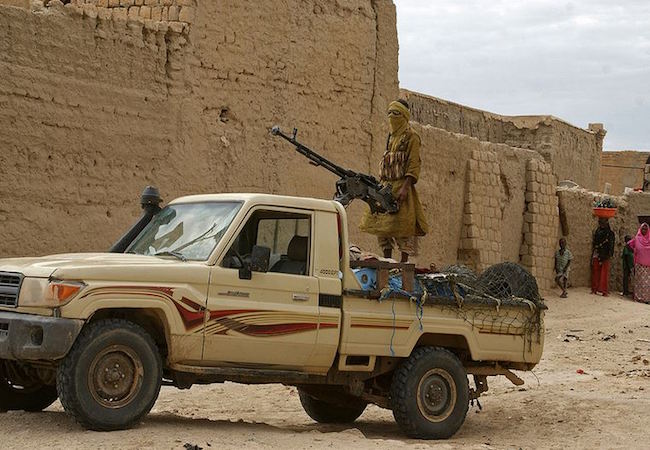Destruction of cultural heritage condemned by the International Criminal Court

By Rene Wadlow
On 22 August 2016, Ahmad Al Faqi Al Mahdi pleaded guilty to organizing and helping to carry out the destruction of nine tombs of Sufi saints in Timbuktu, northern Mali. This is the first trial of the International Criminal Court in which the destruction of UNESCO-designated cultural heritage of humanity sites is a major element of the accusation. The trial is an important milestone in the protection of cultural goods in times of armed conflict.
The evidence against Al Faqi Al Mahdi was overwhelming as originally he was proud of his iconoclastic reputation and spoke openly in public meetings and in his talks to the “moral police” of which he was the intellectual guide. Much of Islamic practice in northern Mali is Sufi-influenced, a devotional current with an emphasis on personal practice rather than communal worship. Sufi leaders are considered “saints” − the Roman Catholic terminology being the closest equivalent. At the death of certain Sufi saints, a mausoleum is built. In the case of north Mali, the mausoleum is of dried mud and brick, rather easily destroyed if that is one’s aim. The mausoleum of a saint becomes a pilgrimage goal for members of the Sufi order of which the saint was a member. Some tombs of saints with a particular reputation become pilgrimage sites for ordinary people in the area, the site is often considered to have healing qualities or to provide protection.
For most of Malian history, Sufi practices co-existed with little tension with other Islamic practices. However, the iconoclastic and anti-Sufi positions of Saudi Arabia have been spread both by Saudi preachers going to preach in other countries and by people going to study Islam in Saudi Arabia. Al Faqi Al Mahdi was trained in both a non-Sufi Koranic school in north Mali not far from Timbuktu and in Saudi Arabia. He was also trained in a Mali Government school for teachers, and Al Faqi Al Mahdi had been the chief teacher of a primary school in north Mali.
In March 2012, Mali was effectively divided into two by an armed uprising in the north. The two half were of roughly equal size, each half about the size of France. Of the 9 to 10 million inhabitants of Mali, about 90 per cent live in the south. In the northern half of the country, there is 10 per cent of the population. The majority of those in the north are Songhoy who are settled ago-pastoralists growing rice, wheat and sorghum. Also in the north but a minority in contrast to the Songhoy are the Touareg, some 850,000, originally a nomadic cattle-herding people also found in southern Algeria and Niger. They refer to themselves as “Kel Tamacheq” − those who speak the Tamacheq language. Touareg was first a derogatory term. However the term Touareg was so widely used that they have taken to using it for themselves.
In March 2012, the northern half of Mali came under the control of two rival Touareg groups with additional non-Toureg fighters coming from other Sahel countries and northern Nigeria. The larger Tourareg faction was the “Movement national de liberation de l’Azawand” (MNLA). It was larger than its rival but less well armed. Its main aim was to create an independent State, to be called Azawad.
The Touareg rival was the “Ansar Dine” − defenders of the faith − a more Islamist group which wanted to apply Islamic law to all of Mali. Many of the Ansar Dine fighters had been trained in Libya. A portion of Col. Muammar el-Qaddafi’s Libyan army and militias was made of Touaregs who returned to northern Mali with weapons on Quddafi’s fall from power.
Although Al Faqi Al Madhi was not at first a member of Ansar Dine, he drew increasingly close to the movement and its vision of an Islamist Mali. From March 2012 until January 2013 when French troops were sent to Mali under a mandate of the UN Security Council, much of northern Mali was under the control of Ansar Dine which tried to impose its understanding of Islamic law in all its most narrow and repressive forms. Music, smoking, and alcohol were banned, and the Sufi tombs were destroyed.
There has been growing international concern about the wanton destruction of cultural heritage. On 27 February 2015, the UN Security Council condemned “the deliberate destruction of irreplaceable religious and cultural artifacts housed in the Mosul Museum and burning of thousands of books and rare manuscripts from the Mosul Library.” A few days earlier, thousands of books from the Mosul, Iraq, University Library had also been burned. The Mosul Museum had a large number of statues from the pre-Islamic Mesopotamian civilizations as well as statues from the Greek Hellenistic period. The spokesman for the Islamic State (ISIS) faction which carried out the destruction maintained that the statues represented gods which had been worshiped, while only the true god should receive worship. This approach to pre-Islamic faiths and their material culture is the same as had led to the destruction of the large Buddha statues in Bamiyam, Afghanistan − monuments that attested to the rich culture along the Silk Road.
However, the destruction of the Sufi tombs in Timbuktu highlights new and dangerous currents of division within the Islamic community itself − anti-Sufi actions which need to be watched and countered.
There have been earlier efforts to preserve cultural heritage in times of armed conflict in particular the Pan-American Roerich Pact of 1935 and the Hague Convention of 1954. The International Criminal Court trial of Ahmad Al Faqi Al Mahdi is the first case of an international court dealing with the deliberate damage of UNESCO-designated cultural sites. Although the Sufi tombs have been rebuilt, largely by the efforts of the local population, the concept of the criminalization of deliberate destruction of cultural heritage is slowly become part of world law. A trend to be encouraged.




